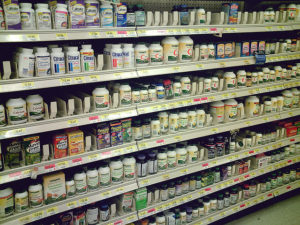What you don’t know about dietary supplements
 They’re in the “health” area of the drugstore and grocery store and say vitamins and minerals so they must be good for you, right? Not always.
They’re in the “health” area of the drugstore and grocery store and say vitamins and minerals so they must be good for you, right? Not always.
We are so used to trusting that the things we consume are safe because in the United States we have a great governmental organization called the Food and Drug Administration (FDA). This organization enforces strict rules and regulations about food and drugs produced and distributed in the U.S. All food and drugs have to be up to certain standards in order to protect our health.
What most people don’t know is that supplements are not regulated under the FDA. In fact they are not regulated at all. Scary! This basically means that producers of supplements do not have any rules to follow when it comes to making and labeling these supplements that are sold to the public. They can pretty much put anything they want in the supplements and write whatever they want to on the labels.
A research study spearheaded by the New York attorney general’s office and summarized in a New York Times article (Feb. 2015) looked at herbal supplements from major retailers including Walmart, Walgreens, GNC and Target. The products were analyzed in a lab to see if they actually contained the ingredients listed on the labels. Researchers found that “5 out of 6 dietary supplement products tested were unrecognizable, contaminated or a substituted product.” For real!
Another thing about some supplements that many people don’t realize is that they include way more of a nutrient than most people need (unless you have a certain deficiency). Your body does need vitamins and nutrients but just like anything else, too much can be harmful. Therefore, taking supplements (without being told to by a health care provider or dietician) may actually have negative and sometimes serious side-effects.
Bottom line is this- It’s important to know what you put into your body. The lack of regulation on the supplement industry means you have to be extra cautious about consuming over-the-counter supplements. Checking with a health care professional before taking them is the best place to start.
– Nutrition Student Aliza

